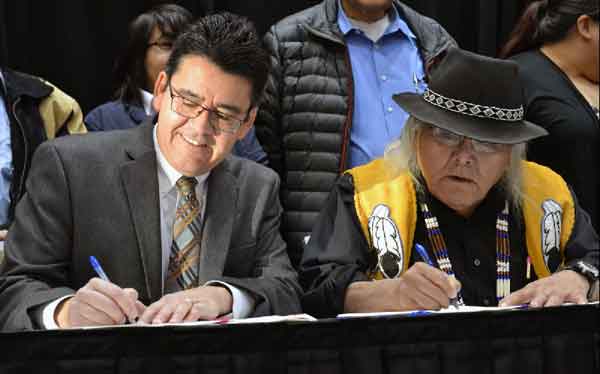
An historical agreement was signed on Tuesday by the Ahtna Intertribal Resource Commission and the U.S. Department of the Interior to create a cooperative management demonstration project formalizing a subsistence wildlife management partnership between the DOI and the AITRC regarding the allocation and harvest of moose and caribou on federal lands in the Ahtna region.
The agreement between AITRC, an entity established by the Ahtna Regional and village corporations and eight federally recognized tribes in the region, and the DOI, is the first of its kind established nation-wide under Secretarial Order No. 3342.
The agreement, announced last month at the Alaska Federation of Natives Conference in Fairbanks by Secretary of the Interior, Sally Jewell, requires the Interior Department to, wherever possible, include tribes in the management of federal land and resources. It recognizes that tribes have special geographical, historical, and cultural connections to Federal lands and waters, and that tribes have traditional ecological knowledge and practices regarding resource management that have been handed down through generations
The Interior Department’s agencies include the National Park Service, Bureau of Land Management, Fish and Wildlife Service, Bureau of Ocean Energy Management and Bureau of Reclamation.
“As Alaska’s population has grown, the Ahtna people have borne the brunt of increasing hunting pressure on their traditional lands because these areas are fairly accessible to much of the Railbelt region, home to 70 percent of Alaska’s population,” said Deputy Secretary Michael L. Connor. “This agreement is an effort to help preserve their traditional way of life, put food on the table, and improve wildlife habitat and populations for everyone.”
Governor Walker and Lieutenant Governor Mallott congratulates AITRC and DOI in finalizing an agreement.
“Ahtna has long-standing concerns about the rules governing the subsistence hunt and the availability of food resources to tribal communities in the Ahtna region,” Governor Walker said. “It is encouraging to see DOI engaging with Ahtna and its tribes and exercising the flexibility provided by federal law to address those concerns.”[xyz-ihs snippet=”adsense-body-ad”]In the same press release, Lt. Governor Mallott said, “We are optimistic that Alaska’s Board of Game, the Department of Fish and Game, and the Federal Subsistence Board will find new opportunities to coordinate the state and federal game management systems and ensure that those Alaskans most in need have access to critical subsistence resources. We appreciate AITRC and DOI including the state in the development of the agreement to lay groundwork for that future collaboration.”
The National Congress of American Indians stated that the effort has been supported by NCAI membership through Resolution, #ANC-14-031, to further develop cooperative management agreements between tribes, states, and the federal governments. NCAI went on to say that they “would like to congratulate Ahtna and applaud the Department of the Interior for signing this cooperative management agreement. The ability to continue to practice our traditional subsistence ways and protect our resources for the next seven generations is of the utmost importance. This agreement will hopefully be a model for further agreements so more tribes can manage their subsistence resources.”
Generally, the Alaska Board of Game and the Department of Fish and Game are responsible for game management in the state. However, under the Alaska National Interest Lands Act (ANILCA), the Federal Subsistence Board oversees the subsistence hunt on federal public lands and provides priority access to rural residents.[xyz-ihs snippet=”Adsense-responsive”]
